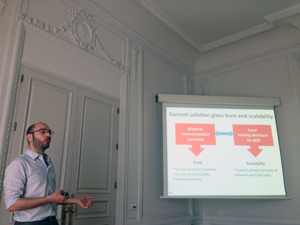IMDEA Networks

PhD Thesis defense: Economics of Internet Interdomain Interconnections

Ignacio Castro, PhD Student, IMDEA Networks Institute, Madrid and Internet Interdisciplinary Institute (IN3) - Open University of Catalonia (UOC), Barcelona, Spain
 The Internet is an evolving ecosystem where a multitude of interconnected networks, or Autonomous Systems (ASes), support global connectivity of end users. By providing economic incentives for routing traffic on behalf of other networks, interconnection agreements between ASes are a cornerstone of the Internet. However, rapid Internet adoption, unrelenting traffic growth, and increasing demands for quality and performance are challenging to cope with, provoke recurrent conflicts over the economic settlement of interconnections, and question the capacity of the Internet to provide critical services. Furthermore, with their capital-intensive network infrastructure, the ASes’ need to recover costs complicates interconnection negotiations and settlements. Overcoming the limitations and bottlenecks of the evolving Internet ecosystem, requires understanding the economics of how networks interconnect and how traffic is routed through them.
The Internet is an evolving ecosystem where a multitude of interconnected networks, or Autonomous Systems (ASes), support global connectivity of end users. By providing economic incentives for routing traffic on behalf of other networks, interconnection agreements between ASes are a cornerstone of the Internet. However, rapid Internet adoption, unrelenting traffic growth, and increasing demands for quality and performance are challenging to cope with, provoke recurrent conflicts over the economic settlement of interconnections, and question the capacity of the Internet to provide critical services. Furthermore, with their capital-intensive network infrastructure, the ASes’ need to recover costs complicates interconnection negotiations and settlements. Overcoming the limitations and bottlenecks of the evolving Internet ecosystem, requires understanding the economics of how networks interconnect and how traffic is routed through them.
This thesis studies the economic aspects of the interconnections between ASes, identifies challenges hampering the future of the Internet, and proposes solutions to resolve them. We begin by presenting the first analytical and empirical study on remote peering, an emerging type of interconnections that relaxes the geographical constraints of ASes and also facilitates interconnections at a lower cost. Then we introduce Cooperative IP Transit (CIPT) and Transit for Peering (T4P), two novel interconnection arrangements that reduce traffic delivery costs for the ASes. However, some of the limitations are inherent to the current Internet architecture. To overcome those constraints, we present Route Bazaar, a new Internet architecture that, inspired by the use of the block chain mechanism and cryptographic tools in cryptocurrencies, provides a contractual framework for flexible interconnections with rich policies.
About Ignacio Castro
Ignacio Castro received his Master degree in Economics from the Universiteit van Amsterdam. He is currently researching in different aspects of networked economies and the economics of the Internet structure.
Personal site at IMDEA Networks
The thesis defense will be conducted in English

The defense starts: Ignacio Castro. |

The doctoral candidate with his adviser: |

Joan Pujolar Cos, the Director of the UOC Doctoral |

Nikolaos Laoutaris, Sergey Gorinsky, Ignacio Castro, |

